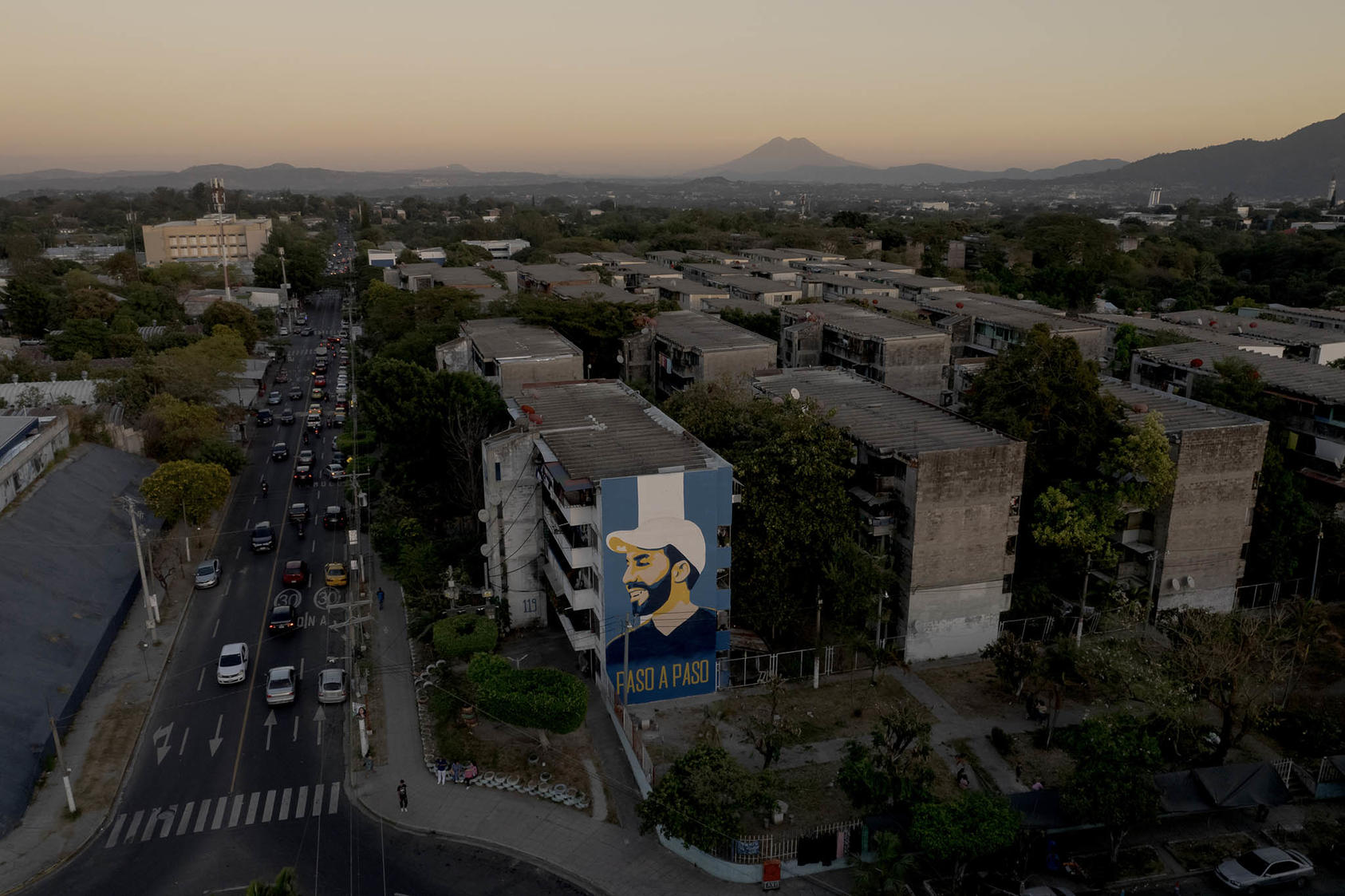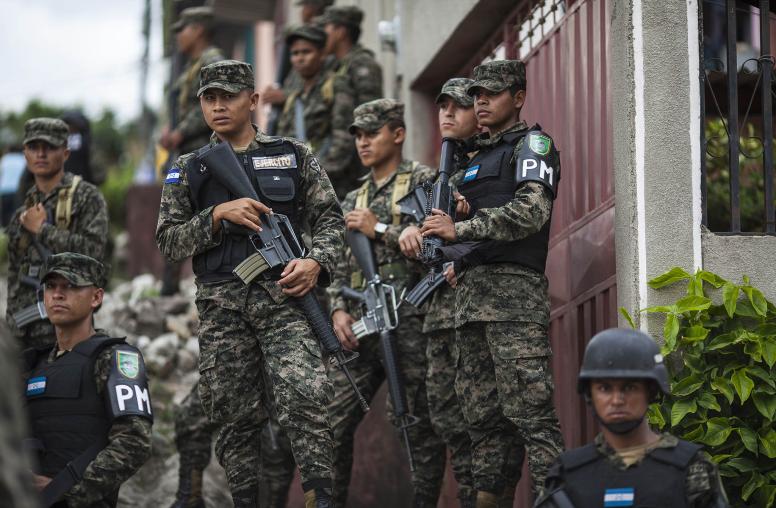El Salvador’s Bukele: From ‘World’s Coolest Dictator’ to ‘Philosopher King’
After easy reelection, president expected to consolidate power, continue controversial war on gangs.
El Salvador’s president, Nayib Bukele, celebrated a landslide electoral victory on Feb. 4, far outstripping his nearest competitor. “The opposition was pulverized,” Bukele told jubilant crowds outside the National Palace on election night. In reply to critics who warn that El Salvador is moving toward authoritarianism, he proclaimed, “we are not substituting democracy because El Salvador has never had democracy.” The leader who once called himself the “world’s coolest dictator” now boasts of being his country’s “philosopher king.”

Bukele’s declaration of total victory was somewhat premature, however. Although his own triumph is clear — initial reports showed him winning more than 80 percent of the presidential vote against less than 10 percent for his nearest competitor — the congressional election remains in doubt. Four days after the vote, authorities were hand counting ballots in a process marred by power and internet outages, technical glitches and other irregularities.
There is no doubt, however, that Bukele enjoys fervent support. Salvadorans credit him with restoring security to a country that once had some of the highest homicide rates in the world. The government seems to be winning its war against the criminal gangs that once dominated the country’s poorest neighborhoods, using violence to extort protection payments from residents, small business owners, street vendors, bus operators and taxi drivers.
But the government’s methods are draconian. Bukele instituted a “state of exception” in March 2022, arresting some 75,000 people, most without clear charges, access to defense lawyers and other due process protections. He plays by his own rules, running for office despite a constitutional ban on consecutive reelection. And critics accuse him of using emergency decrees to detain human rights defenders and other opponents while silencing journalists who criticize his policies.
USIP’s Mary Speck discusses the implications of Bukele’s victory both for El Salvador and for U.S. foreign policy with Mark Feierstein and Ricardo Zuniga, senior advisors in USIP’s Latin America program. Keith Mines, vice president of the Latin America program at USIP, then examines how El Salvador could preserve security gains while also respecting the rule of law and protecting human rights.
Speck: Bukele’s electoral win confirms his status as Latin America’s — and possibly the world’s — most popular leader. What does polling tell us about his strengths and vulnerabilities as he enters his second term in office?
Feierstein: Bukele’s success in combatting crime has not only boosted his own astronomical approval ratings, but also enhanced confidence in Salvadoran institutions like the police, armed forces, congress and judicial bodies.
The strong electoral performance of Bukele and the ruling party also reflects the disintegration of the two traditional parties that dominated Salvadoran politics from the 1992 peace accords until Bukele and their joint failure to improve people’s lives. His overwhelming victory also owes something to the measures that the Bukele government has taken to intimidate critics and restrict the ability of independent institutions like the press, civil society and the private sector to operate freely.
Where then might El Salvador be headed after Sunday? If Bukele’s goal is to concentrate power and rule indefinitely as the “world’s coolest dictator,” are his policies and political standing sustainable?
Public polling offers some warning signs. While Salvadorans, especially those in lower socioeconomic groups, are understandably pleased with the dramatic improvement in public security, they express concerns over measures used to achieve that progress. Majorities oppose the rearrest of persons who served a sentence or were found innocent, reject the suspension of the right to defense, object to arrests without judicial orders and disagree with detaining suspects for more than 72 hours without explaining the basis for the arrest. A clash between Bukele’s ends and methods seems inevitable, especially because the government has yet to develop a policy that would provide for the eventual release of prisoners.
Speck: Relations between Bukele’s government and the Biden administration have been rocky in the past. The United States sanctioned high-level Salvadoran officials for negotiating “a secret truce” with gang leaders in December 2021. Then Bukele spurned an invitation to the administration’s Summit of Americas in June 2022. More recently, the administration seems to have decided to keep criticism private while publicly praising bilateral cooperation on specific issues as “excellent.” Where do relations stand today, following Bukele’s landslide victory?
Zúniga: Washington long ago priced in Bukele’s reelection, despite constitutional constraints on reelection. His concentration of power in the hands of the executive, his broad popularity and the inability of political opponents to make headway made his February 4 victory inevitable. During his second term, Bukele will likely further consolidate power, marginalizing or repressing perceived opponents, while expanding the role of his Nuevas Ideas (New Ideas) party in Salvadoran society.
In this difficult context, the United States is likely to focus on concrete areas where it can advance U.S. policy objectives. Irregular migration remains a top concern. Even though Salvadoran citizens are not currently arriving at the United States’ Southwest border in large numbers, these numbers could tilt upward given the precarious state of the Salvadoran economy. The United States hopes to engage with the Bukele government both to promote sustainable economic growth and to encourage an end to the state of exception with fair trials and the protection of human rights. The continuing challenge for Washington will be how — or whether — to address Bukele’s authoritarian tendencies while maintaining a constructive relationship with a leader who is sensitive to any criticism.
Bukele, meanwhile, appears satisfied with a correct, if not cordial, relationship with Washington. He has not paid a price with the Salvadoran public for his occasionally tense relationship with the Biden administration. But Salvadorans still value good relations with the United States, given their dependence on remittances from the approximately 2.5 million Salvadoran-born migrants in the United States.
In a second term, Bukele seems set to engage the United States on matters that burnish his standing or advance his domestic priorities, while continuing to sharply reject critiques of his political model from Washington.
Speck: During the campaign Bukele vowed to maintain his government’s emergency measures, warning voters that his opponents planned to let gang members go free. Is there any reason to expect Bukele to modify his iron-fist policies during a second term?
Mines: The state of exception has now been extended 22 times. Some hoped the government would shift to policies providing for the fair trial, rehabilitation and eventual reintegration of former gang members. Instead, the exception is simply being regularized as the way to deal with criminal threats.
The government seems determined to keep suspects incarcerated, despite the high social, economic and human rights price tag. “For those accused of terrorism the sentences are cumulative,” Vice President Félix Ulloa told the Financial Times. “You’re seeing sentences of 200 years, 150 years… most of them will be there for life.”
But now could be the time for Bukele — who has declared the country is “on the cusp of winning the war against the gangs” — to pivot to a strategy that preserves his popular security advances while restoring the rule of law. Such a strategy would have several components.
First, it would provide an individualized system of due process for those in jail. El Salvador’s Legislative Assembly has approved a bill authorizing mass trials of up to 900 suspects at a time, which would be unprecedented in the democratic world. Due process means giving individuals the right and the means to defend themselves in court, including against charges of gang affiliation. As Washington Office on Latin America President Carolina Jiménez Sandoval points out, “Forcing individuals to be judged collectively will turn the presumption of innocence upside down.”
Second, the government should implement citizen security dialogues in municipalities, enlisting civil society organizations as partners in enforcing the rule of law. The lack of citizen agency in their own security was one of the factors allowing gangs to gain control of some neighborhoods in the first place. While these dialogues would likely generate criticism of some polices, they could also generate “new ideas” to help sustain the rule of law and keep vulnerable communities from again falling prey to criminals.
Third, the perceived need for a state of exception demonstrated structural weaknesses in the security and justice systems. Inclusion of military forces in many day-to-day security operations, a role the military was neither designed nor trained for, simply papers over deficiencies in the civilian police forces whose job is to investigate, apprehend and detain individuals suspected of criminal offences. The Bukele government should use the breathing space provided by the state of exception to begin largescale police reforms, retooling the forces to enforce the law and prevent violence within a citizen security framework.
The temptation to shun reform and double down on harsh measures that seem to be working at present will be high. But the cost of long-term mass incarceration is also high, especially in a country whose main natural resource is its people. Keeping one out of 45 Salvadoran adults in jail may not be the best long-term economic strategy. A pivot to a more sustainable justice-based system could preserve security gains while also yielding economic benefits. It’s the right thing to do, both morally and pragmatically.


